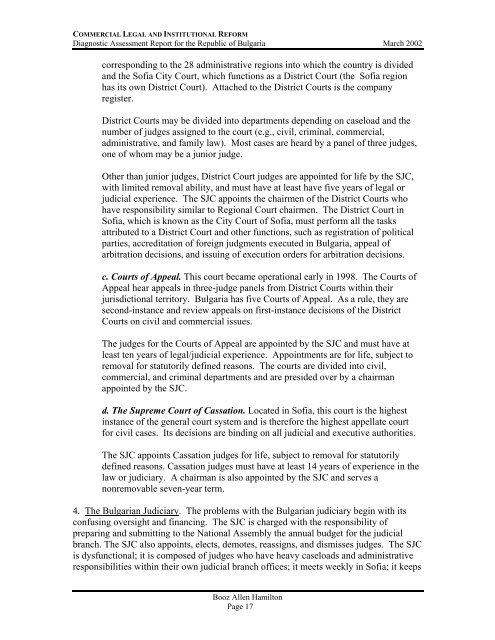Commercial Legal And Institutional Reform (CLIR) - Economic Growth
Commercial Legal And Institutional Reform (CLIR) - Economic Growth
Commercial Legal And Institutional Reform (CLIR) - Economic Growth
You also want an ePaper? Increase the reach of your titles
YUMPU automatically turns print PDFs into web optimized ePapers that Google loves.
COMMERCIAL LEGAL AND INSTITUTIONAL REFORM<br />
Diagnostic Assessment Report for the Republic of Bulgaria March 2002<br />
corresponding to the 28 administrative regions into which the country is divided<br />
and the Sofia City Court, which functions as a District Court (the Sofia region<br />
has its own District Court). Attached to the District Courts is the company<br />
register.<br />
District Courts may be divided into departments depending on caseload and the<br />
number of judges assigned to the court (e.g., civil, criminal, commercial,<br />
administrative, and family law). Most cases are heard by a panel of three judges,<br />
one of whom may be a junior judge.<br />
Other than junior judges, District Court judges are appointed for life by the SJC,<br />
with limited removal ability, and must have at least have five years of legal or<br />
judicial experience. The SJC appoints the chairmen of the District Courts who<br />
have responsibility similar to Regional Court chairmen. The District Court in<br />
Sofia, which is known as the City Court of Sofia, must perform all the tasks<br />
attributed to a District Court and other functions, such as registration of political<br />
parties, accreditation of foreign judgments executed in Bulgaria, appeal of<br />
arbitration decisions, and issuing of execution orders for arbitration decisions.<br />
c. Courts of Appeal. This court became operational early in 1998. The Courts of<br />
Appeal hear appeals in three-judge panels from District Courts within their<br />
jurisdictional territory. Bulgaria has five Courts of Appeal. As a rule, they are<br />
second-instance and review appeals on first-instance decisions of the District<br />
Courts on civil and commercial issues.<br />
The judges for the Courts of Appeal are appointed by the SJC and must have at<br />
least ten years of legal/judicial experience. Appointments are for life, subject to<br />
removal for statutorily defined reasons. The courts are divided into civil,<br />
commercial, and criminal departments and are presided over by a chairman<br />
appointed by the SJC.<br />
d. The Supreme Court of Cassation. Located in Sofia, this court is the highest<br />
instance of the general court system and is therefore the highest appellate court<br />
for civil cases. Its decisions are binding on all judicial and executive authorities.<br />
The SJC appoints Cassation judges for life, subject to removal for statutorily<br />
defined reasons. Cassation judges must have at least 14 years of experience in the<br />
law or judiciary. A chairman is also appointed by the SJC and serves a<br />
nonremovable seven-year term.<br />
4. The Bulgarian Judiciary. The problems with the Bulgarian judiciary begin with its<br />
confusing oversight and financing. The SJC is charged with the responsibility of<br />
preparing and submitting to the National Assembly the annual budget for the judicial<br />
branch. The SJC also appoints, elects, demotes, reassigns, and dismisses judges. The SJC<br />
is dysfunctional; it is composed of judges who have heavy caseloads and administrative<br />
responsibilities within their own judicial branch offices; it meets weekly in Sofia; it keeps<br />
Booz Allen Hamilton<br />
Page 17

















